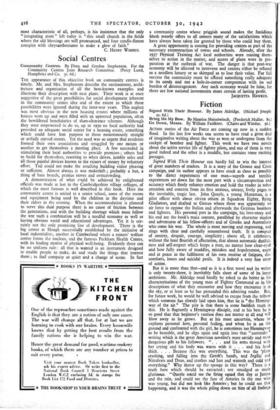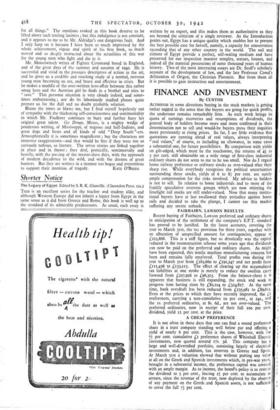Fiction
Bring Me My Bow. By Maurice Moiseiwitsch. (Frederick Muller. 8s.) Go Down, Moses. By William Faulkner. (Chatto and Windus. 9s.)
ACTION stories of the Air Force are coming up now in a sudden flood. In the last few weeks one seems to have read a great deal of imaginative writing about the war as seen or undergone from the cockpit of bomber and fighter. This week we have two novels about the active service life of fighter pilots, and one of them is very good indeed and the other is a muddle, but contains some exciting passages.
Signed With Their Honour can hardly fail to win the interest of great numbers of readers. It is a story of the Greece and Crete campaign, and its author appears to have stuck as close as possible to the direct experiences of one man—superb and terrible experiences set down for the most part with a circumspection and accuracy which finely enhance emotion and hold the reader in sober attention and concern from its first anxious, uneasy, lively pages to the inevitable, tragic last. John Quayle, a young Manxman, is a pilot officer with about eleven others in Squadron Eighty, flying Gladiators, and drafted to Greece where there was apparently no air force to oppose the Italian and afterwards the German bombers and fighters. His personal part in the campaign, his love-story and his end are the book's main content, paralleled by character studies and adventures of his fellow-officers and of Greeks and Australians who come his way. The whole is most moving and engrossing, and rings with clear and carefully remembered truth. It is compact of anxiety, despair, courage, simplicity ; above all, it celebrates, without the least flourish of affectation, that almost automatic dutiful- ness and self-respect which keeps a man, no matter how clear-eyed and how fully aware of muddles, mistakes and hopelessness, eager and at peace in the fulfilment of his own routine of fatigues, dis- comforts, losses and suicidal perils. It is indeed a very fine story of action.
But it is more than that—and as it is a first novel and its writer is only twenty-three, it inevitably falls short of some of its inner ambitions. Mr. Aldridge need hardly be asked to do better in his characterisations of the young men of Fighter Command or in his descriptions of what they encounter and how they encounter it in the sky, or at least so he has persuaded this admiring reader. But, for future work, he would be well advised to escape from the tribute which someone has already laid upon him, that he is "the Heming- way of the air." The pity is that there is some baddish truth in this. He is flagrantly a Hemingway disciple, and at his best he is so good that that beginner's caution does not matter at all and will blow away as he grows. But at his most uncertain, where he explores personal love, personal feeling, and when he is on the ground and confronted with the girl, he is sometimes too Hemingway, to be bearable, and he slips again and again into that "surrender writing which is the great American novelist's most untidy and most dangerous gift to his followers. " . . and his arms moved with her crying and his body was warm with it . . . and his head thick. . . . Because this was everything. This was the 'plane crashing, and falling into the Greek's hands, and Inglisi and Nitralexis and Deus, and crashes and lust and warmth and cold and everything." Why throw up the- sponge in this way? There is a truth here which should be extracted ; not smudged or made glutinous. "Quayle could see the firing squad that day at Janina and the rain, and could see the face of Astaries in the one who was young, but did not look like Astaries ; but he could see that happening, and it was the whole piling down on him of all feelings
for all things." The emotions evoked in this book deserve to be lifted above such trailing laziness ; but this indulgence is not constant, and it appears to me to be Mr. Aldridge's one dangerous fault. And I only harp on it because I have been so much impressed by the whole achievement, vigour and spirit of his first book, so much moved and so deeply instructed about the actualities of this war for the young men who fight and die in it.
Mr. Moiseiwitsch writes of Fighter Command based in England, and of the great days of the summer and autumn of 1940. He is successful and vivid in the passages descriptive of action in the air, and he gives us a credible and touching study of a normal, nervous young man becoming an ace, and brave and effective in crisis. But he makes a muddle of the over-written love-affair between this rather smug hero and the Austrian girl he finds in a brothel and tries to "save." This personal situation is very cloudy indeed, and some- times embarrassing ; nor do its laboriously studied phases quite prepare us for the dull and no doubt probable solution.
Blame the times or blame me, but I find myself hopelessly out of sympathy with the thickening self-consciousness and sentimentality in which 'Mr. Faulkner continues to bury and further bury his original great talent. Go Dovin, Moses, is a mighty wedge of ponderous writing, of Mississippi, of negroes and half-Indians, and great dogs and bears and all kinds of odd "Deep South "-ers. Atmospherically it is sometimes magnificent ; but the characters are immense exaggerations—and that would be fine if they were not so curiously tedious, so literary. The seven stories are linked together in place and in theme ; they deal, poetically, sentimentally and heavily, with the passing of the master-slave days, with the approach of modern decadence to the wild, and with the dreams of great hunters. But they are written in a manner too bogus and pretentious to support their intention of tragedy. KATE O'BRIEN.



























 Previous page
Previous page